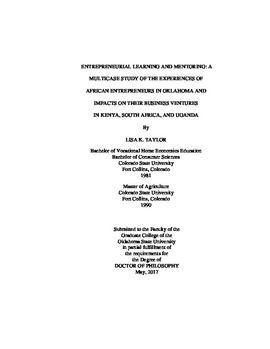| dc.contributor.advisor | Edwards, M. Craig | |
| dc.contributor.author | Taylor, Lisa K. | |
| dc.date.accessioned | 2018-03-13T18:16:29Z | |
| dc.date.available | 2018-03-13T18:16:29Z | |
| dc.date.issued | 2017-05 | |
| dc.identifier.uri | https://hdl.handle.net/11244/54621 | |
| dc.description.abstract | The study's purpose was to describe the views of 22 individuals from Kenya, South Africa, and Uganda (14 men; 8 women) regarding their entrepreneurial experiences after participation in a U.S. Department of State-funded professional development fellowship hosted by Oklahoma State University. The fellowship occurred in two cohort groups with each being five weeks in duration and culminating with conferences in Washington, DC. This study described the Entrepreneur Fellows' perceptions of the program's impact, including its mentoring component, on their entrepreneurial endeavors after returning to their home communities. The unique entrepreneurial education and support needs of women and other marginalized groups were also explored. Decisive steps were taken to ensure the quality of this qualitative study based on protocols identified by Stake (2006), Tracy (2010), and Saldana (2013). The study's semistructured interviews included six research questions and related probes. Each interview was transcribed verbatim by the researcher. These transcriptions were provided to all participants for member checking to ensure credibility and accuracy (Creswell, 2007). The Fellows' reflections were conveyed as 22 cases or facets of crystallization forming the study's quintain (Stake, 2006). Analysis of more than 235 pages of interview data resulted in identifying 2,059 codes, 15 categories, five themes, and supported two substantive interpretive frameworks, human capital theory and the theory of planned behavior. The 15 categories aggregated to create five themes: commitment to youth development; entrepreneurial skills and concepts; mentoring relationships; new media usage integral to entrepreneurial endeavors; and financial needs for business development. Statements supporting the themes were mostly positive regarding the Fellows' perceptions of their personal growth and future entrepreneurial aspirations. Recommendations for practice include training on youth mentorship and entrepreneurship education, especially in and for the agricultural sector; suggestions for facilitating job shadowing/internship-type field experiences; and the provision of financial support to further capitalize the Fellows' ventures. Recommendations for future research include the need to investigate mentor and mentee perceptions of entrepreneurial field experiences, familial influences on the intentions and practices of fellowship participants, and the role of new media in promoting and sustaining global entrepreneurial relationships among various stakeholders and other interested collaborators. | |
| dc.format | application/pdf | |
| dc.language | en_US | |
| dc.rights | Copyright is held by the author who has granted the Oklahoma State University Library the non-exclusive right to share this material in its institutional repository. Contact Digital Library Services at lib-dls@okstate.edu or 405-744-9161 for the permission policy on the use, reproduction or distribution of this material. | |
| dc.title | Entrepreneurial learning and mentoring: A multicase study of the experiences of African entrepreneurs in Oklahoma and impacts on their business ventures in Kenya, South Africa, and Uganda | |
| dc.contributor.committeeMember | Baker, Marshall A. | |
| dc.contributor.committeeMember | Rutledge, James A. | |
| dc.contributor.committeeMember | Watters, Craig E. | |
| osu.filename | Taylor_okstate_0664D_15230.pdf | |
| osu.accesstype | Open Access | |
| dc.type.genre | Dissertation | |
| dc.type.material | Text | |
| thesis.degree.discipline | Agricultural Education | |
| thesis.degree.grantor | Oklahoma State University | |
